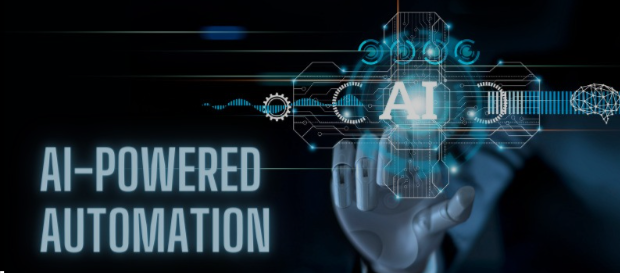Benefits of AI Automation in the Global Supply Chain
The integration of AI automation in global supply chains is revolutionizing the way industries manage, optimize, and enhance their logistics and production processes. From improving efficiency to enabling real-time tracking, AI-powered solutions are transforming how goods move from manufacturers to consumers across the globe. As companies face increased demands, AI automation in the supply chain offers the tools necessary to ensure that they remain competitive, agile, and prepared for future challenges.
AI Automation: A Game Changer in the Global Supply Chain
In recent years, AI automation has emerged as a vital component in the modernization of supply chains. Companies in industries ranging from retail to manufacturing and pharmaceuticals are turning to AI to streamline operations, cut costs, and improve accuracy. By leveraging machine learning and predictive analytics, AI automation allows companies to make data-driven decisions that enhance overall productivity.
In addition, AI technologies like computer vision, natural language processing, and robotics are improving various aspects of the supply chain, from inventory management to distribution. The demand for automated solutions has grown, especially as global trade faces increased disruptions, labor shortages, and complex logistics requirements.
Key Benefits of AI Automation in Supply Chain Management
Implementing AI automation within the supply chain yields several significant benefits, allowing companies to optimize processes and stay resilient in an increasingly dynamic market. Here are some of the key advantages:
1. Enhancing Efficiency and Reducing Operational Costs
One of the most significant benefits of AI automation in the supply chain is the ability to improve operational efficiency and reduce costs. Through automation, companies can streamline repetitive tasks, reducing reliance on manual labor and lowering overhead expenses. Tasks such as order processing, inventory management, and quality control can be automated, allowing employees to focus on strategic and complex roles.
For example, AI-driven systems can analyze historical sales data to forecast demand accurately, which helps companies avoid stockouts and overstocking. As a result, companies not only save on storage costs but also meet customer demand without delays. AI automation solutions like Warehouse Robotics optimize warehouse processes, reducing operational costs by up to 20%.
2. Improving Inventory Management and Demand Forecasting
AI automation empowers companies to predict future demand and manage inventory more accurately. Machine learning algorithms analyze historical sales patterns, current market trends, and even external factors such as seasonal fluctuations and geopolitical issues to make precise demand forecasts. This predictive capability reduces the risk of excess inventory and stock shortages, which can be costly and impact customer satisfaction.
AI-driven demand forecasting also allows businesses to optimize production schedules and align their resources accordingly. For instance, a retail company can use predictive analytics to determine which products will be in high demand during peak shopping seasons, reducing waste and ensuring product availability.
3. Enabling Real-Time Tracking and Enhanced Transparency
Supply chains have become increasingly complex, spanning multiple geographies and involving numerous suppliers and logistics providers. AI automation enhances visibility by enabling real-time tracking of shipments, inventory, and production processes. With real-time data, companies can make faster, more informed decisions to address potential disruptions, delays, or deviations.
Real-time tracking not only benefits businesses but also enhances customer satisfaction. Customers can receive up-to-date information on their orders, creating a seamless and transparent shopping experience. AI-powered tracking tools, such as those employed by major logistics companies, monitor shipments across global routes, helping businesses reduce delays and maintain transparency with clients and partners.
How AI Automation Improves Supply Chain Resilience
Supply chain resilience has become a critical focus for businesses in the wake of recent global disruptions. From pandemics to natural disasters, supply chains are vulnerable to numerous challenges. AI automation plays an essential role in strengthening resilience by helping companies anticipate and respond to potential disruptions.
4. Proactive Risk Management and Resilience Building
AI automation can identify patterns and anomalies in real-time, allowing companies to detect potential issues early on. By analyzing data from various sources—weather reports, political developments, and supplier conditions—AI algorithms can alert managers to potential risks, giving them the chance to implement contingency plans.
This proactive approach enhances supply chain resilience and ensures businesses can mitigate risks without compromising on efficiency or customer satisfaction. Companies that have integrated AI-powered risk management systems report significant reductions in downtime and improved preparedness for unexpected events.
5. Enhancing Supplier Collaboration and Communication
Effective collaboration with suppliers is a vital part of a well-functioning supply chain. AI automation improves supplier communication by streamlining information sharing and ensuring data accuracy. For instance, companies can use AI-powered platforms to share real-time production schedules, inventory levels, and demand forecasts with suppliers, facilitating seamless collaboration.
AI-based platforms also reduce the risk of errors and miscommunications, which can lead to delays or quality issues. This enhanced communication fosters stronger relationships with suppliers, ensuring that businesses have reliable partners to support their supply chain needs. Companies like Toyota and BMW, renowned for their supply chain efficiency, utilize AI systems to maintain smooth and transparent communication with suppliers worldwide.
AI-Powered Solutions for Sustainability in the Supply Chain
As businesses work towards sustainability, AI automation is a key enabler in reducing the environmental impact of supply chains. By optimizing routes, reducing waste, and enhancing energy efficiency, AI plays a pivotal role in helping companies meet their sustainability goals.
6. Reducing Carbon Emissions and Optimizing Transportation Routes
AI-powered solutions can optimize transportation routes, reducing fuel consumption and minimizing carbon emissions. For example, AI algorithms analyze traffic patterns, weather conditions, and other logistical factors to create the most efficient delivery routes. This not only reduces environmental impact but also lowers operational costs associated with fuel and maintenance.
Large companies with complex distribution networks are using AI to streamline logistics, contributing to sustainability initiatives while saving costs. The logistics industry is seeing rapid adoption of such AI-driven tools, with companies like DHL actively implementing AI to reduce carbon emissions and promote eco-friendly practices.
7. Minimizing Waste and Improving Resource Utilization
AI automation contributes to waste reduction by improving inventory accuracy and demand forecasting. When companies can predict demand accurately, they avoid overproduction, which helps reduce waste. AI systems can also monitor energy usage in warehouses and production facilities, identifying opportunities for energy savings.
With the rise of circular economy models, AI automation is playing a crucial role in recycling and repurposing products, helping companies minimize waste and improve their resource efficiency.
Future Prospects: The Expanding Role of AI Automation in Supply Chains
AI automation will continue to play an increasingly significant role in the global supply chain as more companies adopt advanced technologies. Innovations like AI-driven robotics, machine learning-based quality control, and autonomous delivery vehicles are set to revolutionize logistics and manufacturing.
In the future, the integration of AI automation with other technologies, such as blockchain and IoT (Internet of Things), will enhance transparency, security, and efficiency in the supply chain. These technologies combined will allow companies to track products from raw materials to end-users, creating fully traceable and accountable supply chains.
Overcoming Challenges to AI Automation Adoption
Despite the numerous benefits, implementing AI automation in supply chains comes with challenges. Data privacy, cybersecurity, and the need for skilled personnel are significant considerations for companies looking to adopt AI. Additionally, high implementation costs may deter smaller businesses from integrating AI into their supply chains.
However, with the increasing availability of AI as a service (AIaaS) and cloud-based solutions, more companies can access these technologies without extensive upfront investment. Partnerships with tech companies, along with government incentives for innovation, will further support the adoption of AI automation in the supply chain.
Conclusion: AI Automation and the Future of the Global Supply Chain
AI automation is reshaping the global supply chain landscape, bringing unprecedented efficiency, resilience, and sustainability. By adopting AI-driven solutions, businesses can optimize operations, reduce environmental impact, and improve customer satisfaction. As companies continue to face evolving market demands, the need for agile and intelligent supply chains will only grow.
AI automation presents a transformative opportunity, positioning businesses to thrive in a competitive and complex global market. Embracing this technology not only supports operational goals but also aligns with broader goals of sustainability and innovation. The future of supply chain management is undoubtedly linked to AI automation, and companies that invest in this technology today will lead the market tomorrow.





